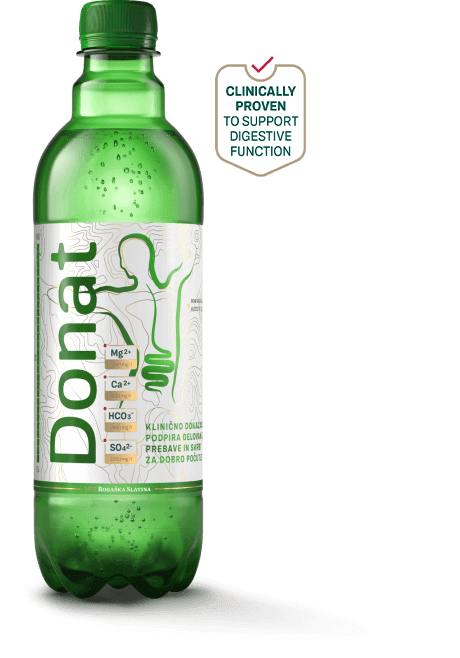If you are reading this article, most probably you have already experienced the burning sensation in your chest that is also called heartburn. However, if you still haven’t had it and you are reading this text out of pure curiosity, consider yourself lucky because you are one of the rare ones (but keep reading, just in case!😉).
Heartburn is an extremely uncomfortable problem, but luckily it normally isn’t dangerous because the burning sensation quickly disappears. However, if in your case the burning sensation persists, you are probably asking yourself how long can that state actually last.
It would be good to know more about heartburn for the next time you experience it. That’s why we have gathered key information in this article about how long we can suffer from it and when it would be a good idea to do something about it.
Back to Basics: What is Heartburn?
Don’t be mad if you already know the definition. We just want to educate you and really make sure everyone understands what’s going on in their bodies. So give us a few seconds for the basics before we move to the main part ?.
Despite its name, heartburn has no connection with your heart, even though it can come with symptoms similar to those of a heart attack. It describes the reaction that happens when the muscles around the bottom of your oesophagus (the tube connecting your stomach and throat) weaken or become too relaxed. If your muscles are not strong enough, acid can escape from the stomach into your food pipe and travel all the way up to your throat and mouth.
This process causes that unpleasant heartburn feeling, which can be treated in various ways. However, if you’re not used to experiencing it or feel like the symptoms don’t seem to be improving, the whole situation can become more worrying.
So, How Long Does Heartburn Last?
Sadly, it’s difficult to say how long your heartburn is going to last, as this depends on each individual. For some it goes away after a few minutes, and with others it can stick around for hours or even days.
If you’re experiencing the milder form of this condition that usually occurs after eating certain foods, then your heartburn symptoms can last until your body has digested the meal. The symptoms can also return when you lie down or bend over, as this puts extra pressure on the sphincter muscle.
If you’re not among the “lucky ones” who only get heartburn during the day, you might be wondering how long heartburn can last at night. This form is known to be the most painful, and can even keep you up the whole night, and it’s also the most dangerous, since the stomach acid can stay in your oesophagus for longer, causing more damage to it. Night-time heartburn can also point to a more serious underlying medical condition, one that should be checked by a doctor.

Is Heartburn Dangerous?
As mentioned before, mild heartburn that passes quite quickly on its own or with the use of over-the-counter medication is generally not dangerous.
However, a chronic form of heartburn called GERD, or gastroesophageal reflux disease, is a more serious condition. It can lead to significant complications and permanent damage to your oesophagus, which can even result in cancer.
So, could heartburn and GERD in the worst case cause a serious illness? Unfortunately, the answer is yes. If stomach acid gets to esophagus too often and stays there for too long, it can seriously damage the body.
Let’s have a closer look at some serious conditions that can be caused by GERD:
1. Oesophagitis
Oesophagitis describes inflammation or irritation of your oesophagus. This condition leads to difficult or painful swallowing, a sore throat, hoarseness and heartburn.
If your esophagitis does not get treated, it can result in ulcers, scarring and even narrowing of your oesophagus. Additionally, oesophagitis can also increase your risk of cancer.
2. Oesophageal Ulcers
Frequent exposure to stomach acids can cause chronic inflammation of your oesophagus, which represents the perfect environment for the development of ulcers.
This medical condition comes with symptoms that, in addition to heartburn, include indigestion, painful swallowing, nausea, abdominal pain, and blood in your stool, among other unpleasant things.
An untreated ulcer can lead to serious complications such as a rupture in your oesophagus or upper gastrointestinal bleeding.
3. Aspiration Pneumonia
During a heartburn attack, stomach acid normally rises to your throat or mouth but can also end up being inhaled into your lungs. The acid of course has a negative effect on your lungs, and if they’re not able to clear up on their own then this can lead to a lung infection called aspiration pneumonia.
Some of the symptoms are chest pain, high body temperature, coughing, labored breathing, general fatigue, and even blueish skin.
If your pneumonia doesn’t get treated immediately, the situation can become extremely serious or even fatal, which is why consulting a doctor to prevent complications is vital.

4. Barrett’s Oesophagus
Chronic damage to your oesophagus caused by stomach acid can cause changes in the squamous cells that form its lining. When this happens, the cells can get replaced by gland cells, similar to the ones in your intestines. Such cells can turn cancerous, and even result in oesophageal cancer.
Symptoms of Barrett’s esophagus are actually very similar to the ones in GERD: frequent heartburn, chest pain and difficulties in swallowing food.
You should talk to your doctor if you often get heartburn or GERD, and especially if you’ve been experiencing those symptoms for more than five years.
5. Oesophageal Cancer
As mentioned above, GERD or heartburn slightly increase your risk of getting oesophageal cancer. As its name suggests, this form of cancer occurs in your oesophagus. It normally starts with deformation of your cells, which can be due to Barrett’s oesophagus.
The condition causes symptoms similar to the ones typical for the above-mentioned diseases, such as difficulty swallowing, chest pain, frequent coughing and severe forms of heartburn, as well as indigestion.
As mentioned before, seek medical help immediately if you’re not sure which condition you’re experiencing or believe your symptoms could point to something more serious.
Note that symptoms of oesophageal cancer usually only become evident once cancer has reached a more advanced state, so make sure you react before it’s too late.
How to Treat Heartburn
Now you’ve learned that frequent and prolonged heartburn can be extremely dangerous, as the exposure to stomach acid can cause a lot of damage to your body. There are of course some remedies that could help your heartburn will go away as soon as possible.
1.Medication
The first and most obvious one is medication. Over-the-counter medications are usually effective in alleviating the symptoms of heartburn, as they work towards reducing the acidity in your throat.
However, if your heartburn is chronic or you’re experiencing GERD, your doctor will have to prescribe stronger medications.

2. Better Diet
When heartburn occurs, many people immediately reach for medications, and they don’t know that even small changes in diet and natural remedies can greatly alleviate the problem of heartburn. If you often suffer from heartburn that can last even the entire day, start keeping a food diary to understand which food causes the burning sensation.
Heartburn often appears after a spicy, salty or fatty meal, as these can slow down your digestion or cause your oesophageal sphincter to relax and enable the backflow of stomach acid.
Additionally, consuming a lot of chocolate, caffeine and alcohol can have an impact on your oesophageal sphincter, and cause the gastric contents to rise.
If looking for new habits to avoid frequent heartburn, you should consider eating more alkaline foods like green vegetables, bananas and melons that should calm down your acid reflux.
3. Lifestyle Changes
Being overweight dramatically increases your chances of getting heartburn, as more pressure is put on your abdomen, thus enabling stomach acid to escape. Fight your heartburn by being active and losing weight. You’ll also do your immune system a favour.
Additionally, think about your body in terms of posture, too. Bad posture, just like extra weight, can put pressure on your stomach, so make sure you sit upright, at least when you’re eating. If you often suffer from night-time heartburn, elevate the head of your bed to prevent stomach acid from coming up your throat while you sleep.
4. Natural Mineral Water
When your throat is on fire, bicarbonates are among your best friends. And no drink is richer in bicarbonates than Donat, natural mineral water that isn’t only a great remedy for constipation but is also known to efficiently alleviate the symptoms of acid reflux. It will neutralise the stomach acid that has escaped into your food pipe, and so calm it down.

However, if you really want Donat to work against heartburn, you need to drink it correctly. Always drink it on an empty stomach, and before each bigger meal. Treat yourself to 0.1 – 0.2 l of this mineral water each time, and make sure it’s at room temperature. Also bear in mind that you need to drink it for at least a few days to really feel the benefits of its healing powers.
When to See Your Doctor
The suggestions set out above are just some of the changes you could make to reduce the symptoms of heartburn, and the list is not exhaustive. If you still feel no relief after following them, you should definitely consult your doctor.
The following situations should encourage you to make a doctor’s appointment as soon as possible:
- severe signs: if you’re experiencing severe signs of heartburn (difficulty swallowing food, nausea, bleeding, unexplained weight loss, chronic cough etc.), seek medical help to make sure the exposure to stomach acid doesn’t cause irreparable harm to your body;
- uncertainty: talk to a professional if you’re not sure whether you’re actually experiencing heartburn, as there are some other conditions with overlapping symptoms that point to serious complications (such as a heart attack);
- frequent GERD: if you experience the symptoms of GERD several times a week then see your doctor immediately, even if the symptoms are mild;
- regular use of over-the-counter medications: being a regular user of over-the-counter antacids or other medications can be dangerous, as they will only neutralise your symptoms but cannot heal the actual inflammation that causes them;
- no relief after medication: if you still have heartburn symptoms even after taking prescription or over-the-counter medications, discuss the matter with your doctor to see where the problem is;
- problems engaging in your daily activities: if frequent or chronic heartburn symptoms are interfering with your daily activities, seek professional help to get your life back on track.

The Takeaway
There’s no clear answer to how long heartburn can last, as it can range from only a few moments to hours or even days. The important thing to remember is that occasional heartburn is usually nothing to worry about, and you can get rid of it with small lifestyle changes.
However, if you experience frequent or chronic heartburn that just doesn’t seem to go away, consult your doctor straightaway. Untreated heartburn can lead to more serious conditions, such as oesophagitis, Barrett’s oesophagus or even cancer. Your doctor will help identify an underlying cause and appropriate treatment, so you’ll never have to wonder how long your acid reflux attack is going to last again.
Frequently asked questions
1. What is heartburn?
Heartburn is a burning sensation in the chest caused by weakened or overly relaxed muscles at the lower end of the esophagus. That way stomach acid can escape to the esophagus, causing the burning sensation.
2. Can heartburn harm your health?
Occasional and mild heartburn does not represent a health risk, but if the problem becomes chronical, stomach acid can damage the esophagus and lead to serious health complications. Chronic heartburn is called “GERD” or gastroesophageal reflux disease which in the worst cases can even cause cancer.
3. What might be the consequences of heartburn?
Occasional mild heartburn does not have serious consequences, but if the acid regularly gets into the esophagus, it can permanently damage it and thereby affect the health. More serious consequences include an inflammation or irritation of the lining of the esophagus (esophagitis), esophagus ulcers, aspiration pneumonia, and even cancer.
4. How can we effectively get rid of heartburn?
We can fight heartburn with losing weight, avoiding nutrients that cause heartburn (such as peppermint, raw onion, citruses, tomatoes, fatty food,…), alcohol, soft drinks and sweet juice and by lifting the bed’s headboard. It is also recommended not to go to bed immediately after a large meal, wear more comfortable clothes, avoid stress, and stop smoking. If heartburn happens more often and doesn’t go away, the best is to consult your doctor.
5. How long does heartburn usually last?
The duration of heartburn is different for each person. If certain type of food causes heartburn, the symptoms usually disappear after the problematic food is processed. In some people the burning sensation calms down after just a few minutes, but that is not a rule, and it can last up to a few days in some other cases. However, if heartburn lasts even longer and if it occurs even more frequently, we recommend that you see your doctor as soon as possible.
Choose chapter:






